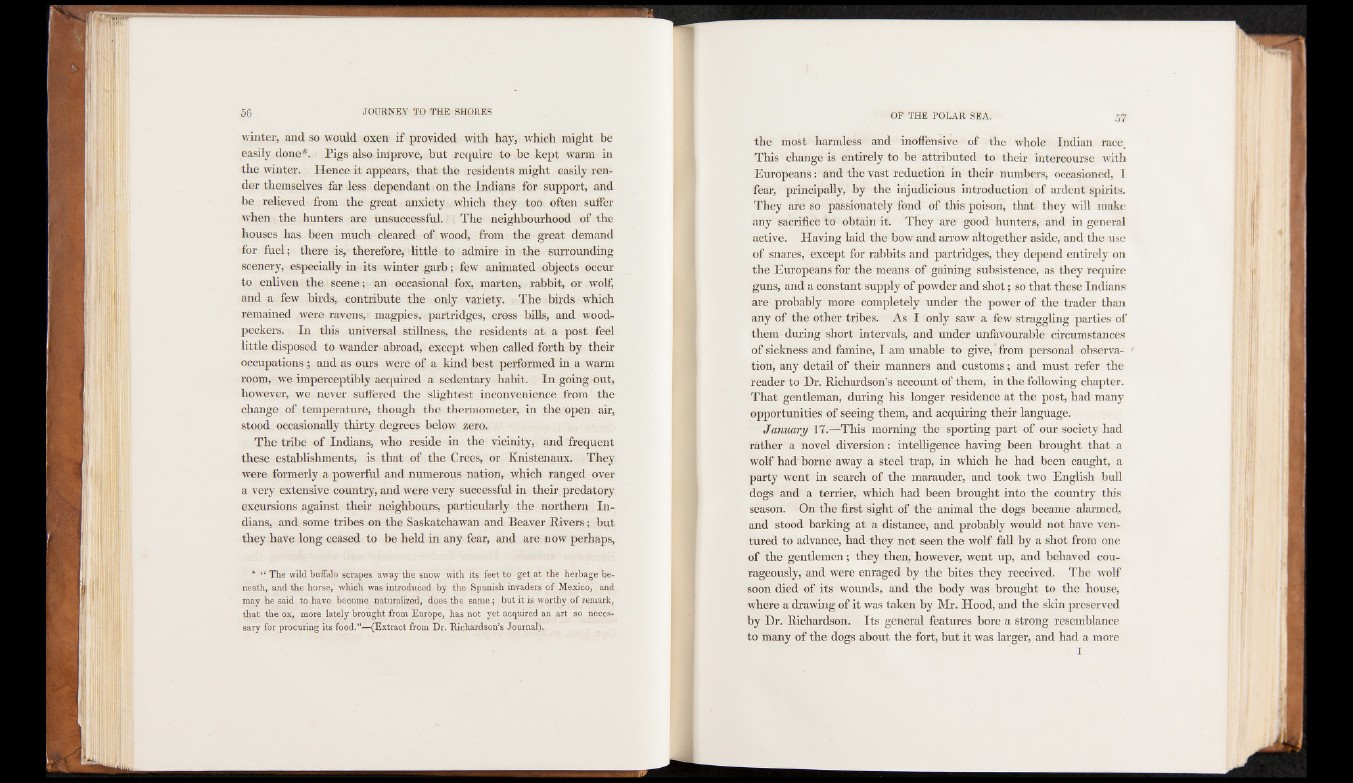
winter, and so would oxen if provided with hay, which might be
easily done*. Pigs also improve, but require to be kept warm in
the winter. Hence it appears, that the residents might easily render
themselves far less dependant on the Indians for support, and
be relieved from the great anxiety . which they too often suffer
when the hunters are unsuccessful. The neighbourhood of the
houses has been much cleared of wood, from the great demand
for fuel; there is, therefore, little to admire in the surrounding
scenery, especially in its winter garb; few animated objects occur
to enliven the scene; an occasional fox, marten, rabbit, or wolf,
and a few birds, contribute the only variety. The birds which
remained were ravens, magpies, partridges, cross bills, and woodpeckers.
In this universal stillness, the residents at a post feel
little disposed to wander abroad, except when called forth by their
occupations ; and as ours were of a kind best performed in a warm
room, we imperceptibly acquired a sedentary habit. In going out,
however, we never suffered the slightest inconvenience from the
change of temperature, though the thermometer, in the open air,
stood occasionally thirty degrees below zero.
The tribe of Indians, who reside in the vicinity, and frequent
these establishments, is that of the Crees, or Knistenaux. They
were formerly a powerful and numerous nation, which ranged over
a very extensive country, and were very successful in their predatory
excursions against their neighbours, particularly the northern Indians,
and some tribes on the Saskatchawan and Beaver Rivers; but
they have long ceased to be held in any fear, and are now perhaps,
* <c The wild buffalo scrapes away the snow with its feet to get at the herbage beneath,
and the horse,' which was introduced by the Spanish invaders of Mexico, and
may be said to have become naturalized, does the same ; but it is worthy of remark,
that the ox, more lately brought from Europe, has not yet acquired an art so necessary
for procuring its food.”—(Extract from Dr. Richardson’s Journal),
the most harmless and inoffensive of the whole Indian race.
This change is entirely to be attributed to their intercourse with
Europeans: and the vast reduction in their numbers, occasioned, I
fear, principally, by the injudicious introduction of ardent spirits.
They are so passionately fond of this poison, that they will make
any sacrifice to obtain it. They are good hunters, and in general
active. Having laid the bow and arrow altogether aside, and the use
of snares, except for rabbits and partridges, they depend entirely on
the Europeans for the means of gaining subsistence, as they require
guns, and a constant supply of powder and shot; so that these Indians
are probably more completely under the power of the trader than
any of the other tribes. As I only saw a few straggling parties of
them during short intervals, and under unfavourable circumstances
of sickness and famine, I am unable to give,"from personal observation,
any detail of their manners and customs; and must refer the
reader to Dr. Richardson’s account of them, in the following chapter.
That gentleman, during his longer residence at the post, had many
opportunities of seeing them, and acquiring their language.
January 17.—This morning the sporting part of our society had
rather a novel diversion: intelligence having been brought that a
wolf had borne away a steel trap, in which he had been caught, a
party went in search of the marauder, and took two English bull
dogs and a terrier, which had been brought into the country this
season. On the first sight of the animal the dogs became alarmed,
and stood barking at a distance, and probably would not have ventured
to advance, had they not seen the wolf fall by a shot from one
of the gentlemen; they then, however, went up, and behaved courageously,
and were enraged by the bites they received. The wolf
soon died of its wounds, and the body was brought to the house,
where a drawing of it was taken by Mr. Hood, and the skin preserved
by Dr. Richardson. Its general features bore a strong resemblance
to many of the dogs about the fort, but it was larger, and had a more